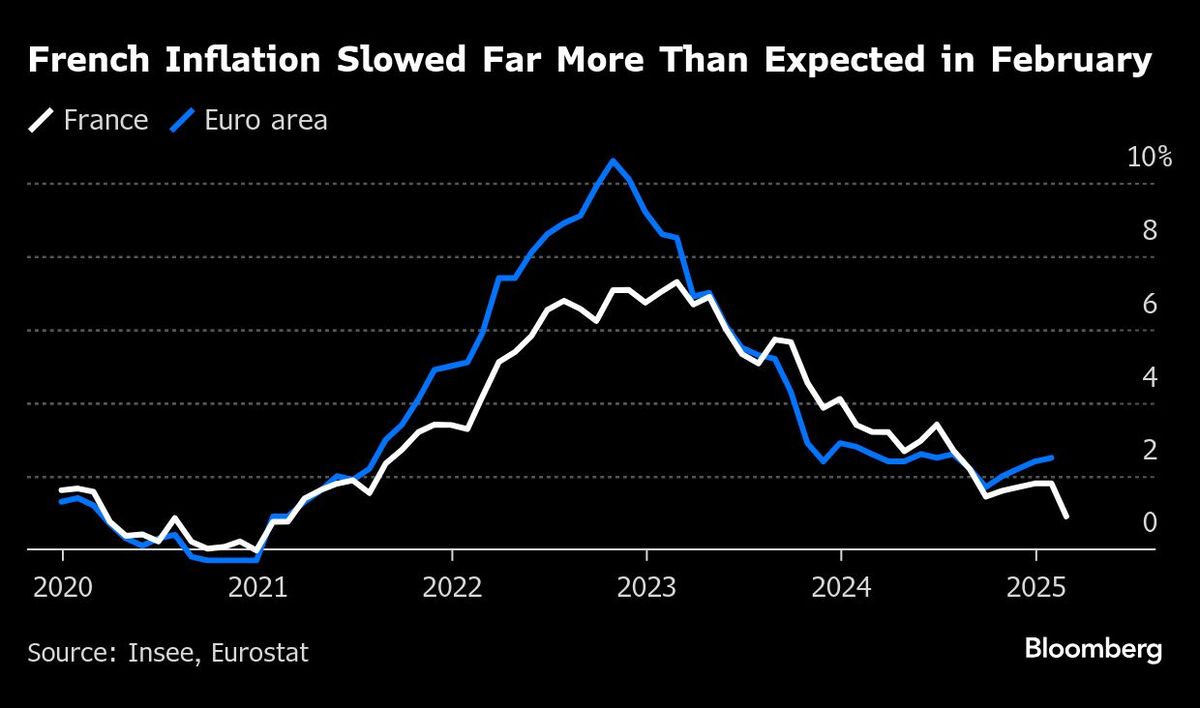
(Feb 28): French inflation retreated to its lowest level in four years, bolstering the case for further interest-rate cuts by the European Central Bank (ECB), whose next move is likely to arrive next week.
Consumer prices in the euro area’s second-largest economy rose 0.9% from a year ago in February after a 1.8% increase in January, statistics agency Insee said on Friday. Analysts polled by Bloomberg had forecast an advance of 1.1%.
European bonds rallied at the open. French yields fell three basis points (bps) across the curve, while those on two-year Bunds dropped below 2% for the first time in more than a year. Money markets boosted wagers on ECB rate cuts now favour four more quarter-point reductions this year for the first time in almost three weeks.
Inflation is uneven across the region: In contrast to France, Spanish prices jumped 2.9% this month. But the ECB remains confident it will achieve its 2% goal this year — particularly as the bloc’s economy struggles.
A clearer picture of price pressures will emerge later on Friday, when readings from Germany and Italy are published. Figures for the 20-nation currency bloc, due on Monday, are likely to show a moderation to 2.3%.
That should allow the ECB to cut its deposit rate again next week, to 2.5% from 2.75%, bringing total easing since June to 150bps. What happens beyond that is less clear as some officials worry about services inflation, higher energy prices and US trade tariffs, while others fret more about sluggish economic growth and the risk of undershooting the target.
Analysts surveyed by Bloomberg before next week’s rate decision see a greater chance of overshooting. Such concerns may be fanned by separate numbers from Germany showing import prices jumped by the most in two years in January.
“Looking ahead, we expect France’s headline and core readings to climb again in March, largely reflecting the influence of unfavourable base effects, rather than increasing near-term cost pressure. Thereafter we think further declines will be recorded, taking inflation to a low in the summer months,” say Bloomberg Economics economists Jean Dalbard and Jamie Rush.
The French data showed a slightly slower pace of gains for closely watched services prices, which reached 2.1%. Energy costs fell 5.7%.
Separate figures on Friday from Insee confirmed the economy contracted by 0.1% in the last quarter of 2024. Household spending power stagnated.
Uploaded by Felyx Teoh
- Gas pipeline blaze: Petronas Gas, Gas Malaysia’s shares open marginally lower after trading halt
- Gas pipeline blaze: MIDF flags potential RM18m impact to Petronas Gas
- Police to look into allegations that digging caused gas pipeline fire
- Digital banks in Malaysia urged to re-examine strategies to better serve B40 segment
- T7 Global plunges to two-year low as executive deputy chairman departs
- Al-Aqar REIT faces earnings risks with lease renewal of key properties, acquisition — analysts
- Putra Heights blaze: Housing Ministry studying best way to help displaced victims
- Walmart keeps price pressure on suppliers after Beijing pushback — Bloomberg
- Alibaba prepares for flagship AI model release as soon as April, Bloomberg News reports
- US dollar outlook more subdued, but tariffs souring sentiment

